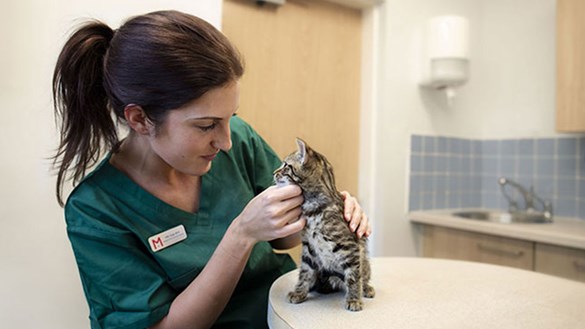Taking Your Cat To The Vet
Taking your cat to the vet needn’t be stressful. With a little bit of time and preparation, you can make it a positive experience for both you and your pet.

Regular health checks for your cat are essential to ensuring your cat stays happy and healthy.
Whether it’s your cat’s first visit or they’ve been before, keep reading for our essential advice on taking your cat to the vet.
How to prepare
Preparation is key to ensure your visit goes as smoothly as possible, particularly for cat owners.
Once you’ve booked your appointment, you should think about any pet care questions you’d like to ask your vet or nurse. If your cat is feeling sick or unwell, write down all their symptoms to take with you; this will help your vet in diagnosing the root of the issue.
Some appointments, such as diagnostic tests and surgery, will require your cat to fast up to eight hours beforehand, so make sure you double-check with the receptionist upon booking. Similarly, you may be asked to collect a urine sample on the morning of the appointment to bring with you.
Getting them there
One of the trickiest parts of taking your cat to the vet is transporting them to the practice. Cats like to be in control of their surroundings and usually prefer to be in familiar environments, so often don’t do well in carriers or strange environments.
It’s important to familiarise your cat to their carrier as early as possible. Keep it in a place where your cat likes to sit, for example, a sunny or warm spot, and place their blanket, toys and a few kibble treats inside. This will create a positive association with going in their crate, making it much easier to shut them in when it comes to going out.
Don’t just bring it out of the cupboard when you’re about to go the vet; they’ll come to associate it only with a potentially frightening or uncomfortable experience.
If your cat is unwilling to go into their carrier, place your carrier on its end, so the open door is facing the ceiling, and put a towel in the bottom to absorb any accidents.
Use gentle, confident movements to pick them up under their front legs, with your other hand supporting their bottom, and lower their rear end first into the carrier – this will prevent them from feeling forced into a ‘no way out’ situation. Close and secure the door and slowly return to its normal position. Placing a blanket over the top will help calm your cat, as well as using soothing voice commands.
Secure the carrier firmly in the car and drive carefully and gently to avoid stressing out your cat.
What to bring to the vet
When visiting the vet, don’t forget to bring:
- A favourite toy or blanket to help keep them calm
- A carry crate for safe transportation
- A urine sample (if necessary)
- A special treat to reward them afterwards
If you’re visiting the vet for the first time, you may also need to bring your cat’s medical records and any medications they’re currently taking.
During the appointment
The best way to ensure a successful vet visit is to remain calm – your cat will be able to sense fear or anxiety, which will make them feel nervous and unsafe. Remember, your vet is always there to help you and your pet’s wellbeing is their priority.
Most cats become spooked by over-excited dogs, so many Medivet clinics have separate cat and dog waiting areas to help keep stress to a minimum. If this isn’t possible, some clinics offer dedicated cat-only appointment times where every effort is made to maintain a quiet, calm environment that cats can relax in. Always check with your local vet to find out what they offer.
Appointments will vary depending on what it’s for, but it’s always important to listen to any advice your vet has about your cat’s health. Don’t be afraid to ask any questions you may have; your vet or nurse will be more than happy to help.
You may need to offer comfort or hold your cat if they become nervous or if they need injections. Speaking calmly and gently will help put them at ease.
Sometimes a follow-up appointment is required, so don’t forget to speak to the reception team to organise this at a time to suit you.
Reward your cat for good behaviour at the end of the appointment with their favourite treat. This will help them make a positive association with going to the vet and will gradually train them to be well-behaved during their appointment.
Find your nearest practice
Book an appointment through My Medivet
Medivet clients can book and amend appointments online, access pet records and more.

Medivet Healthcare Plan
On average our clients save up to £280 each year with the Medivet Healthcare Plan.
Learn more

Pet Care & Advice
At Medivet, we’re committed to providing trustworthy, expert advice that helps you care for your pet.
Search advice

